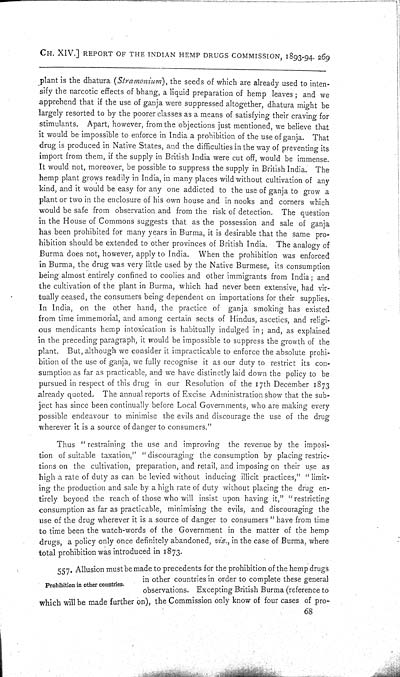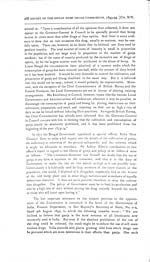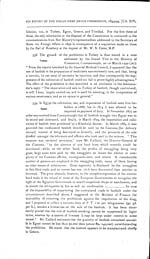Medicine - Drugs > Report of the Indian Hemp Drugs Commission, 1894-1895 > Volume I
(303) Page 269
Download files
Individual page:
Thumbnail gallery: Grid view | List view

CH. XIV.] REPORT OF THE INDIAN HEMP DRUGS COMMISSION, 1893-94. 269
plant is the dhatura
(Stramonium), the seeds of which are already used to
inten-
sify the narcotic effects of bhang, a liquid preparation of hemp
leaves; and we
apprehend that if the use of ganja were suppressed altogether,
dhatura might be
largely resorted to by the poorer classes as a means of satisfying
their craving for
stimulants. Apart, however, from the objections just mentioned, we
believe that
it would be impossible to enforce in India a prohibition of the use
of ganja. That
drug is produced in Native States, and the difficulties in the way
of preventing its
import from them, if the supply in British India were cut off,
would be immense.
It would not, moreover, be possible to suppress the supply in
British India. The
hemp plant grows readily in India, in many places wild without
cultivation of any
kind, and it would be easy for any one addicted to the use of ganja
to grow a
plant or two in the enclosure of his own house and in nooks and
corners which
would be safe from observation and from the risk of detection. The
question
in the House of Commons suggests that as the possession and sale of
ganja
has been prohibited for many years in Burma, it is desirable that
the same pro-
hibition should be extended to other provinces of British India.
The analogy of
Burma does not, however, apply to India. When the prohibition was
enforced
in Burma, the drug was very little used by the Native Burmese, its
consumption
being almost entirely confined to coolies and other immigrants from
India; and
the cultivation of the plant in Burma, which had never been
extensive, had vir-
tually ceased, the consumers being dependent on importations for
their supplies.
In India, on the other hand, the practice of ganja smoking has
existed
from time immemorial, and among certain sects of Hindus, ascetics,
and religi-
ous mendicants hemp intoxication is habitually indulged in; and, as
explained
in the preceding paragraph, it would be impossible to suppress the
growth of the
plant. But, although we consider it impracticable to enforce the
absolute prohi-
bition of the use of ganja, we fully recognise it as our duty to
restrict its con-
sumption as far as practicable, and we have distinctly laid down
the policy to be
pursued in respect of this drug in our Resolution of the 17th
December 1873
already quoted. The annual reports of Excise Administration show
that the sub-
ject has since been continually before Local Governments, who are
making every
possible endeavour to minimise the evils and discourage the use of
the drug
wherever it is a source of danger to consumers."
Thus "restraining the use
and improving the revenue by the imposi-
tion of suitable taxation," "discouraging the consumption by
placing restric-
tions on the cultivation, preparation, and retail, and imposing on
their use as
high a rate of duty as can be levied without inducing illicit
practices," "limit-
ing the production and sale by a high rate of duty without placing
the drug en-
tirely beyond the reach of those who will insist upon having it,"
"restricting
consumption as far as practicable, minimising the evils, and
discouraging the
use of the drug wherever it is a source of danger to consumers"
have from time
to time been the watch-words of the Government in the matter of the
hemp
drugs, a policy only once definitely abandoned, viz., in the
case of Burma, where
total prohibition was introduced in 1873.
Prohibition in other countries.
557. Allusion must be
made to precedents for the prohibition of the hemp
drugs
in other countries in order
to complete these general
observations. Excepting British Burma (reference to
which will be made further on), the Commission only know of four
cases of pro-
68
Set display mode to: Large image | Zoom image | Transcription
Images and transcriptions on this page, including medium image downloads, may be used under the Creative Commons Attribution 4.0 International Licence unless otherwise stated. ![]()
| India Papers > Medicine - Drugs > Report of the Indian Hemp Drugs Commission, 1894-1895 > Volume I > (303) Page 269 |
|---|
| Permanent URL | https://digital.nls.uk/74574672 |
|---|---|
| Description | Chapter XIV, cont. |
| Description | [Volume 1]: Report. |
|---|---|
| Attribution and copyright: |
|




